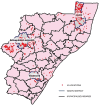Can verbal autopsies be used on a national scale? Key findings and lessons from South Africa's national cause-of-death validation study
- PMID: 39269021
- PMCID: PMC11404373
- DOI: 10.1080/16549716.2024.2399413
Can verbal autopsies be used on a national scale? Key findings and lessons from South Africa's national cause-of-death validation study
Abstract
Background: Verbal autopsy (VA), though imperfect, serves as a vital tool to determine cause-of-death, particularly for out-of-facility deaths, but challenges persist in integrating VA into Civil Registration and Vital Statistics systems.
Objective: To describe the challenges and successes of collecting a national sample of verbal autopsy interviews in South Africa to obtain the cause of death profile in 2017/18.
Methods: We recruited next of kin from 27 randomly selected sub-districts (10.5%) across South Africa between September 2017 and April 2018. Trained fieldworkers conducted face-to-face interviews using the WHO2016 VA instrument, with physicians certifying underlying causes of death. Feasibility was evaluated based on response rates, participation, and data quality.
Results: Of the total 36,976 deaths registered, only 26% were identified during recruitment, with a 55% overall response rate for VA interviews. Physician-reviewed VA data were deemed of good quality for assigning underlying causes of death in 83% of cases. By comparing cause-specific mortality fractions, physician-reviewed VA identified 22.3% HIV/AIDS and InterVA-5 identified 18.5%, aligning with burden of disease estimates, while Statistics South Africa reported 4.9% HIV/AIDS.
Conclusions: The study demonstrated the feasibility of using VA on a national scale, but immense challenges in identifying and recruiting next of kin highlight the importance of formalising VAs within the country's death notification system.
Keywords: Cause of death; Civil Registration and Vital Statistics; South Africa; cause-specific mortality fractions; verbal autopsy.
Plain language summary
• Main findings: Next of kin of 9 730 decedents were approached at the time of registration of death and 55% consented to be approached later and agreed to do a VA interview by a trained field-worker; 83% of physician-reviewed VA data were considered high-quality for determining underlying causes and 22.3% of all the deaths were due to HIV/AIDS, much higher than the proportion reported in the national statistical office.• Added knowledge: Implementing the VA on a national scale was achievable but significant challenges in recruiting next of kin, emphasising a need to formalise VAs within the country’s death notification system.• Global health impact for policy and action: Accurate cause-of-death data are crucial for policymakers to make informed decisions about the country’s health system and could be supported by using VAs, particularly for the deaths that occur outside health facilities.
Conflict of interest statement
No potential conflict of interest was reported by the author(s).
Figures





Similar articles
-
Telephonic verbal autopsies among adults in South Africa: a feasibility and acceptability pilot study.BMJ Open. 2025 Feb 19;15(2):e090708. doi: 10.1136/bmjopen-2024-090708. BMJ Open. 2025. PMID: 39971600 Free PMC article.
-
Community health workers trained to conduct verbal autopsies provide better mortality measures than existing surveillance: Results from a cross-sectional study in rural western Uganda.PLoS One. 2019 Feb 13;14(2):e0211482. doi: 10.1371/journal.pone.0211482. eCollection 2019. PLoS One. 2019. PMID: 30759139 Free PMC article.
-
Agreement between cause of death assignment by computer-coded verbal autopsy methods and physician coding of verbal autopsy interviews in South Africa.Glob Health Action. 2023 Dec 31;16(1):2285105. doi: 10.1080/16549716.2023.2285105. Epub 2023 Dec 1. Glob Health Action. 2023. PMID: 38038664 Free PMC article.
-
Validation of verbal autopsy methods for assessment of child mortality in sub-Saharan Africa and the policy implication: a rapid review.Pan Afr Med J. 2019 Aug 22;33:318. doi: 10.11604/pamj.2019.33.318.16405. eCollection 2019. Pan Afr Med J. 2019. PMID: 31692720 Free PMC article. Review.
-
New challenges for verbal autopsy: Considering the ethical and social implications of verbal autopsy methods in routine health information systems.Soc Sci Med. 2017 Jul;184:65-74. doi: 10.1016/j.socscimed.2017.05.002. Epub 2017 May 3. Soc Sci Med. 2017. PMID: 28501755 Review.
Cited by
-
Fediša Modikologo: breaking the intergenerational cycle of violence against women and children. Theoretical framework and protocol for a prospective cohort study.Wellcome Open Res. 2025 Aug 7;10:126. doi: 10.12688/wellcomeopenres.23513.2. eCollection 2025. Wellcome Open Res. 2025. PMID: 40708771 Free PMC article.
-
Telephonic verbal autopsies among adults in South Africa: a feasibility and acceptability pilot study.BMJ Open. 2025 Feb 19;15(2):e090708. doi: 10.1136/bmjopen-2024-090708. BMJ Open. 2025. PMID: 39971600 Free PMC article.
References
-
- de Savigny D, Riley I, Chandramohan D, et al. Integrating community-based verbal autopsy into civil registration and vital statistics (CRVS): system-level considerations. Glob Health Action. 2017;10:1272882. Epub 2017/02/01. doi: 10.1080/16549716.2017.1272882 PubMed PMID: 28137194; PubMed Central PMCID: PMC5328373. - DOI - PMC - PubMed
MeSH terms
Grants and funding
LinkOut - more resources
Full Text Sources
Miscellaneous
